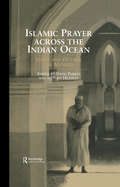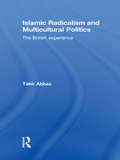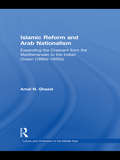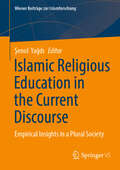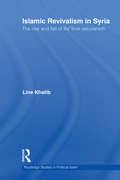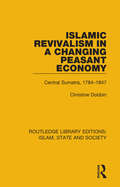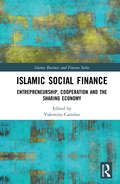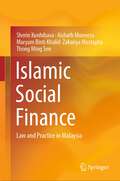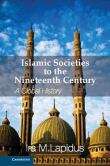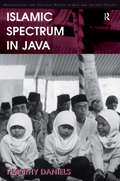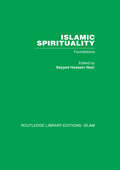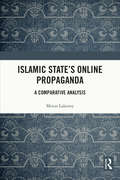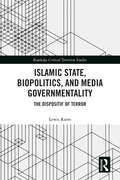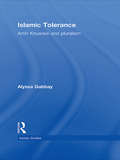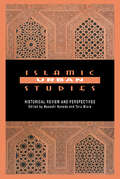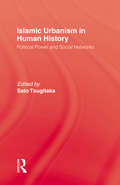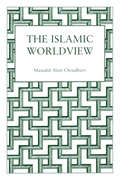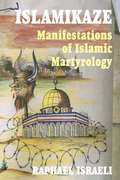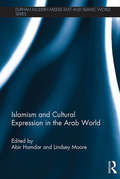- Table View
- List View
Islamic Politics, Muslim States, and Counterterrorism Tensions
by Peter HenneThe US Global War on Terror and earlier US counterterrorism efforts prompted a variety of responses from Muslim states despite widespread Islamic opposition. Some cooperated extensively, some balked at US policy priorities, and others vacillated between these extremes. This book explains how differing religion-state relationships, regimes' political calculations, and Islamic politics combined to produce patterns of tensions and cooperation between the United States and Muslim states over counterterrorism, using rigorous quantitative analysis and case studies of Pakistan, the United Arab Emirates, and Turkey. The book combines recent advances in the study of political institutions with work on religion and politics to advance a novel theory of religion and international relations that will be of value to anyone studying religion, terrorism, or Islamic politics. It also provides numerous insights into current events in the Middle East by extending its analysis to the Arab Spring and the rise of the Islamic State.
Islamic Prayer Across the Indian Ocean: Inside and Outside the Mosque (Routledge Indian Ocean Series)
by David Parkin Stephen HeadleyIn its attempt to squash the influence of animism and pantheism or polytheism and to promote the idea of the One and Only Absolute God, Islam has come up against a tendency within itself to incorporate certain local religious traditions and practices. This book shares that combination of universality and local particularity, exploring this paradox and the contradictory tendencies contained in it.
Islamic Radicalism and Multicultural Politics: The British Experience
by Tahir AbbasThe expression of an Islamic political radicalism in Britain has been one of the most dramatic developments in recent decades. Islamic Radicalism and Multicultural Politics explores the nature of this phenomenon by analysing the origins of Islam and its historical contact with Western Europe and Britain, and the emergence of Islamic political radicalism in the Muslim world and in the West. Tahir Abbas draws on historical analysis and contemporary case studies to explore the post-war immigration and integration of Muslim groups, the complex relations that exist between a secular liberal Britain and a diverse but multifaceted Islam, and the extent of social and economic inequalities that affect Muslims as individual citizens and in local area communities. He shows how violent extremism among British Muslims is in reality influenced by a range of issues, including the factors of globalisation and contemporary politics, media and culture. Analysing and dissecting public policy, Abbas offers suggestions for tackling the major social, political and economic questions facing British Muslims in the post-7/7 era. An important contribution to the study of religion, ‘race’ and ethnicity in modern Britain, this accessible work will be of interest to anyone working in the field of Islamic studies, sociology and political radicalism. Cover design by Mahtab Hussain, www.mahtabhussain.com
Islamic Reform and Arab Nationalism: Expanding the Crescent from the Mediterranean to the Indian Ocean (1880s-1930s) (Culture and Civilization in the Middle East)
by Amal N. GhazalBridging African and Arab histories, this book examines the relationship between Islam, nationalism and the evolution of identity politics from late 19th Century to World War II. It provides a cross-national, cross-regional analysis of religious reform, nationalism, anti-colonialism from Zanzibar to Oman, North Africa and the Middle East. This book widens the scope of modern Arab history by integrating Omani rule in Zanzibar in the historiography of Arab nationalism and Islamic reform. It examines the intellectual and political ties and networks between Zanzibar, Oman, Algeria, Egypt, Istanbul and the Levant and the ways those links shaped the politics of identity of the Omani elite in Zanzibar. Out of these connections emerges an Omani intelligentsia strongly tied to the Arab cultural nahda and to movements of Islamic reform, pan-Islamism and pan-Arabism. The book examines Zanzibari nationalism, as formulated by the Omani intelligentsia, through the prism of these pan-Islamic connections and in the light of Omani responses to British policies in Zanzibar. The author sheds light on Ibadism - an overlooked sect of Islam - and its modern intellectual history and the role of the Omani elite in bridging Ibadism with pan-Islamism and pan-Arabism. Although much has been written about nationalism in the Arab world, this is the first book to discuss nationalism in Zanzibar in the wider context of religious reform and nationalism in the Arab world, and the first to offer a new framework of analysis to the study of pan-Islamic and pan-Arab movements and nationalism.
Islamic Religious Education in the Current Discourse: Empirical Insights in a Plural Society (Wiener Beiträge zur Islamforschung)
by Şenol YağdıThe volume presents the most current empirical research in the field of Islamic religious education. Its findings are an important contribution to the development of theory in Islamic religious education. The contributions address the challenges of Islamic religious education and professionalization research of Islamic religious education teachers and in a plural society.
Islamic Revival in Nepal: Religion and a New Nation (Routledge Contemporary South Asia Series)
by Megan Adamson SijapatiThis book draws on extensive fieldwork among Muslims in Nepal to examine the local and global factors that shape contemporary Muslim identity and the emerging Islamic revival movement based in the Kathmandu valley. Nepal's Muslims are active participants in the larger global movement of Sunni revival as well as in Nepal's own local politics of representation. The book traces how these two worlds are lived and brought together in the context of Nepal's transition to secularism, and explores Muslim struggles for self-definition and belonging against a backdrop of historical marginalization and an unprecedented episode of anti-Muslim violence in 2004. Through the voices and experiences of Muslims themselves, the book examines Nepal’s most influential Islamic organizations for what they reveal about contemporary movements of revival among religious minorities on the margins--both geographic and social--of the so-called Islamic world. It reveals that Islamic revival is both a complex response to the challenges faced by modern minority communities in this historically Hindu kingdom and a movement to cultivate new modes of thought and piety among Nepal’s Muslims.
Islamic Revivalism in Syria: The Rise and Fall of Ba'thist Secularism (Routledge Studies in Political Islam)
by Line KhatibContemporary studies on Syria assume that the country’s Ba’thist regime has been effective in subduing its Islamic opposition, placing Syria at odds with the Middle East’s larger trends of rising Islamic activism and the eclipse of secular ideologies as the primary source of political activism. Yet this assumption founders when confronted with the clear resurgence in Islamic militantism in the country since 2004. This book examines Syria’s current political reality as regards its Islamic movement, describing the country’s present day Islamic groups – particularly their social profile and ideology – and offering an explanation of their resurgence. The analysis focuses on: Who are today’s Syrian Islamic groups? Why and how are they re-emerging after 22 years of relative silence as an important socio-economic and political force? How is the Syrian state dealing with their re-emergence in light of Syria’s secularism and ideologically diverse society? Bridging area studies, Islamic studies, and political science, this book will be an important reference for those working within the fields of Comparative Politics, Political Economy, and Middle Eastern Studies.
Islamic Revivalism in a Changing Peasant Economy: Central Sumatra, 1784-1847 (Routledge Library Editions: Islam, State and Society)
by Christine DobbinThis title, first published in 1983, is a significant study of one of the many revivalist movements which flowered in numerous Islamic societies in the late eighteenth and early nineteenth centuries, and attempts to provide one particular assessment of the place of revivalism in the evolution of Islamic societies. The subject of this title is the Padri movement, and the community involved is that of the Minangkabau of Central Sumatra, one of the major communities inhabiting the Indonesian archipelago. In the process of considering the reconstruction of a society in the throes of an agricultural transformation, the historical development of the Indonesian village became the object of attention, encompassing the economic and social histories of individual villages. This title will be of interest to students of history and Islamic Studies.
Islamic Social Finance: Entrepreneurship, Cooperation and the Sharing Economy (Islamic Business and Finance Series)
by Valentino CattelanThe current dynamics of world economy show remarkable changes in the socio-economics of credit provision and entrepreneurship. If the emergence of the sharing economy is fostering innovative models of collaborative agency, networking and venture business, economic actors are also looking for a more sustainable development, able to foster profitability as well as community welfare. This book investigates Islamic social finance as a paramount example of this economy under change, where the balance between economic efficiency and social impact is contributing to the transformation of the market from an exchange- to a community-oriented institution. The collected essays analyse the social dimension of entrepreneurship from an Islamic perspective, highlighting the extent to which the rationales of "sharing," distribution and cooperation, affect the conceptualization of the market in Islam as a place of "shared prosperity." Moving from the conceptual "roots" of this paradigm to its operative "branches," the contributing authors also connect the most recent trends in the financial market to Shari‘ah-based strategies for community welfare, hence exploring the applications of Islamic social finance from the sharing economy, FinTech and crowdfunding to microcredit, waqf, zakat, sukuk and green investments. An illuminating reference for researchers, practitioners and policy-makers dealing with the challenges of a global market where not only is diversity being perceived as a value to be fostered, but also as an important opportunity for a more inclusive economy for everybody.
Islamic Social Finance: Law and Practice in Malaysia
by Aishath Muneeza Sherin Kunhibava Maryam Binti Khalid Zakariya Mustapha Thong Ming SenThis book addresses the growing significance of Islamic social finance as an alternative and sustainable financing approach in the world. With a focus on Malaysia, a global leader in Islamic banking and finance, the topics covered fills the gap in the extant research by providing in-depth coverage of the legal framework surrounding Islamic social finance. Written with students, researchers, and policymakers in mind, it explores the unique features and principles of Islamic social finance, which aims to achieve social objectives alongside financial returns. By examining real-life case studies and digital examples, readers will gain valuable insights into the practical application of Islamic social finance principles. Each chapter concludes with self-review questions, allowing students to assess their understanding and consolidate their knowledge. This book serves as a valuable resource for academics, researchers, and practitioners seeking to explore and implement Islamic social finance principles. With its comprehensive coverage and practical insights, it will will play a crucial role in promoting the understanding and adoption of Islamic social finance for sustainable development.
Islamic Societies to the Nineteenth Century
by Ira M. LapidusFirst published in 1988, Ira Lapidus' A History of Islamic Societies has become a classic in the field, enlightening students, scholars, and others with a thirst for knowledge about one of the world's great civilizations. This book, based on fully revised and updated parts one and two of this monumental work, describes the transformations of Islamic societies from their beginning in the seventh century, through their diffusion across the globe, into the challenges of the nineteenth century. The story focuses on the organization of families and tribes, religious groups and states, showing how they were transformed by their interactions with other religious and political communities. The book concludes with the European commercial and imperial interventions that initiated a new set of transformations in the Islamic world, and the onset of the modern era. Organized in narrative sections for the history of each major region, with innovative, analytic summary introductions and conclusions, this book is a unique endeavour.
Islamic Spectrum in Java (Anthropology and Cultural History in Asia and the Indo-Pacific)
by Timothy DanielsThis empirically grounded work explores the emerging aspects of cultural politics in the world’s most populous Muslim nation. It engages with complex issues of cultural translation, localization and globalization from various perspectives through analyzing a diverse range of cultural forms, including government or palace-based celebrations, ceremonies and rituals, modern student theatre, and Islamic revival sessions. With its discussion of both old and new Islamic movements, alongside the contested religious interpretations of public cultural events, this book will be of interest not only to anthropologists, but also to scholars of religion, culture and sociology.
Islamic Spirituality: Foundations (World Spirituality Ser. #Vol. 20)
by Seyyed Hossein NasrOriginally published 1987. The first part of the volume is concerned with "The Roots of the Islamic Tradition and Spirituality". These are seen to include the Qu’ran as the central theophany of Islam, the Prophet who received the word of God and made it known to mankind and the rites of Islam. The second part examines the divisions of the Islamic community with their distinctive pieties and emphases: Sunnism and Shi’ism and female spirituality. Part III is devoted to Sufism – its nature and origin, its early development, its various spiritual practices and its science of the soul.
Islamic State's Online Propaganda: A Comparative Analysis
by Miron Lakomy'Explaining the means utilized by the editors of the Islamic State’s online magazines to win the "hearts and minds" of their audiences, this book is a result of a multidimensional content analysis of two flagship periodicals of the IS.' Dabiq and Rumiyah. Drawing from a number of theoretical concepts in propaganda studies, the research uses comparative analysis to understand the evolution of the modus operandi employed by the editorial staff. The volume evaluates the types of arguments used in these magazines, as well as the emotions and behaviour that these triggered in readers. This book concentrates on the formats and thematic composition of a variety of the Islamic State’s e-periodicals, including Dabiq, Rumiyah, Dar al-Islam or Konstantiniyye, from the viewpoint of the constantly changing strategic situation and priorities of the "Caliphate." The e-magazines of the post-territorial phase of the Islamic State, e.g. From Dabiq to Rome and Youth of the Caliphate, were also taken into consideration. Overall, this book does not only offer new insights into the propaganda methods of the Islamic State’s periodicals, but it also summarizes their rise and fall between 2014 and 2019. The volume is dedicated mostly to academics and postgraduate students specialized in terrorism studies, political violence and security studies.
Islamic State, Biopolitics and Media Governmentality: The Dispositif of Terror (Routledge Critical Terrorism Studies)
by Lewis RarmThis book analyses the Islamic State’s (IS) media and governance strategy from a critical media and cultural studies perspective. It deploys Deleuze and Guattari’s concept of assemblage and Foucault’s theories of dispositif (dispositive, apparatus) and biopower to understand the ways in which IS governed its subjects during the tenure of its so-called ‘caliphate’. This theoretical triangulation is used to situate the group as more than just a terrorist organisation, but rather as a more amorphous force with proclivities toward governance. The analysis of globally fluid and conjunctive terrorist strategies executed through media, governance and conduct, as part of and produced by IS’s dispositif, manifests in the group’s epistemology, discourse and social ontology. To analyse these processes, the book deploys a dispositif analysis of official IS administrative documents, media produced by the group’s English-language media wing (al-Hayat Media Center), and IS Twitter activity, including the use of nonhuman bots. In doing so, it seeks to reveal the resonance between IS’s media and governmental discourses, develop dispositif theory, and to argue for more context-specific formulations of biopolitics. This book will be of much interest to students of Critical Terrorism Studies, social theory, media theory and International Relations.
Islamic Terror and the Balkans
by Shaul ShayThe disintegration of Yugoslavia in the early 1990s ended the Yugoslavian Federation, which for nearly fifty years had succeeded in preserving a delicate coexistence among the ethnic, religious, and national components contained within it. Following this, the Balkans became a violent arena of confrontation due to these warring factions. Islamic Terror and the Balkans describes and analyzes the growth of radical Islam in the Balkans from its inception during the years of World War II to the present.Shay's account shows how the Bosnian War between the Muslims and the Serbs provided the historical opportunity for radical Islam to penetrate the Balkans, at a time when the Muslim world, headed by Iran and the various Islamic terror organizations, including Al-Qaida, came to the aid of the Muslims in Bosnia. In the framework of the mobilization of these entities in aiding the Muslim side in the conflict, the operational and organizational infrastructure of Iranian intelligence and the Revolutionary Guards was established, as well as those operated by other Islamic terror organizations.When war in Bosnia ended, terrorist infrastructures remained in the Balkans and served as a basis for these entities' intervention in the confrontation that developed in the Balkans in the late-1990s, specifically in Kosovo and Macedonia. Today, the Balkans serve as a forefront on European soil for Islamic terror organizations, which exploits this area to promote their activities in Western Europe, Russia, and other focal points worldwide. Shay's analysis of terror activity in the aftermath of the September 11 attacks and exposure of terror cells throughout the world, and particularly in Europe, attest to the increasing involvement of the "Balkan alumni" and of the terrorist infrastructure from this area in creating global terror activity.
Islamic Thought Through Protestant Eyes
by Mehmet KarabelaEarly modern Protestant scholars closely engaged with Islamic thought in more ways than is usually recognized. Among Protestants, Lutheran scholars distinguished themselves as the most invested in the study of Islam and Muslim culture. Mehmet Karabela brings the neglected voices of post-Reformation theologians, primarily German Lutherans, into focus and reveals their rigorous engagement with Islamic thought. Inspired by a global history approach to religious thought, Islamic Thought Through Protestant Eyes offers new sources to broaden the conventional interpretation of the Reformation beyond a solely European Christian phenomenon. Based on previously unstudied dissertations, disputations, and academic works written in Latin in the seventeenth and eighteenth centuries, Karabela analyzes three themes: Islam as theology and religion; Islamic philosophy and liberal arts; and Muslim sects (Sunni and Shi‘a). This book provides analyses and translations of the Latin texts as well as brief biographies of the authors. These texts offer insight into the Protestant perception of Islamic thought for scholars of religious studies and Islamic studies as well as for general readers. Examining the influence of Islamic thought on the construction of the Protestant identity after the Reformation helps us to understand the role of Islam in the evolution of Christianity.
Islamic Thought: An Introduction
by Abdullah SaeedIslamic Thought is a fresh and contemporary introduction to the philosophies and doctrines of Islam. Abdullah Saeed, a distinguished Muslim scholar, traces the development of religious knowledge in Islam, from the pre-modern to the modern period. The book focuses on Muslim thought, as well as the development, production and transmission of religious knowledge, and the trends, schools and movements that have contributed to the production of this knowledge. Key topics in Islamic culture are explored, including the development of the Islamic intellectual tradition, the two foundation texts, the Qur’an and Hadith, legal thought, theological thought, mystical thought, Islamic Art, philosophical thought, political thought, and renewal, reform and rethinking today. Through this rich and varied discussion, Saeed presents a fascinating depiction of how Islam was lived in the past and how its adherents practise it in the present. Islamic Thought is essential reading for students beginning the study of Islam but will also interest anyone seeking to learn more about one of the world’s great religions.
Islamic Tolerance: Amir Khusraw and Pluralism (Iranian Studies)
by Alyssa GabbayAlthough pluralism and religious tolerance are most often associated today with Western Enlightenment thinkers, the roots of these ideologies stretch back to non-Western and premodern societies, including many under Muslim rule. This book explores the development of pluralism in Islam in South Asia through the work of the poet, historian and musician Amir Khusraw and sheds new light on how Islam developed its own culture of tolerance. Countering stereotypes of Islam as intrinsically intolerant, the book provides a better understanding of how rhetorics of pluralism develop, which may aid in identifying and encouraging such discourses in the present. Khusraw, a practicing Muslim who showed great affection toward Hindus and used much indigenous imagery in his poetry, is an ideal figure through whom to explore these issues. Addressing issues of ethnicity, religion and gender in the early medieval period, Alyssa Gabbay demonstrates the pre-modern precedents for pluralism, conveying the broad sweep of Perso-Islamicate culture and the profound transformations it underwent in medieval South Asia. Accurately depicting the paradoxicality and jaggedness involved in the development of its composite culture, this book will have great relevance to scholars and students of Islam in South Asia, gender, religious pluralism, and Persian literature.
Islamic Urban Studies: Historical Review and Perspectives (Islamic Area Studies #2)
by Masashi HanedaThe term 'Islamic cities' has been used to refer to cities of the Islamic world, centring on the Middle East. Academic scholarship has tended to link the cities of the Islamic world with Islam as a religion and culture, in an attempt to understand them as a whole in a unified and homogenous way. Examining studies (books, articles, maps, bibliographies) of cities which existed in the Middle East and Central Asia in the period from the rise of Islam to the beginning of the 20th century, this book seeks to examine and compare Islamic cities in their diversity of climate, landscape, population and historical background. Coordinating research undertaken since the nineteenth century, and comparing the historiography of the Maghrib, Mashriq, Turkey, Iran and Central Asia, Islamic Urbanism provides a fresh perspective on issues that have exercised academic concern in urban studies and highlights avenues for future research.
Islamic Urbanism: Political Power and Social Networks
by Sato TsugitakaIslamic cultures in the Middle East have inherited and developed a legacy of urbanism spanning millennia to the ancient civilizations of the region. In contrast to well-organized states like China in history, Muslim peoples formed loose states based on intricate social networks. As a consequence, most studies of urban history in the Middle East have focused their gaze exclusively on urban social organization, often neglecting the extension of political power to rural areas. Covering Morocco, Egypt, Syria, Iran and Brunei, this volume explores the relationship between political power and social networks in medieval and modern Middle Eastern history. The authors examine social, religious and administrative networks that governed rural and urban areas and led to state formation, providing a more inclusive view of the mechanisms of power and control in the Islamic world.
Islamic Veiling in Legal Discourse
by Anastasia VakulenkoIslamic Veiling in Legal Discourse looks at relevant law and surrounding discourses in order to examine the assumptions and limits of the debates around the issue of Islamic veiling that has become so topical in recent years. For some, Islamic veiling indicates a lack of autonomy, the oppression of women and the threat of Islamic radicalism to western secular values. For others, it suggests a positive autonomous choice, a new kind of gender equality and a legitimate exercise of one’s freedom of religion – a treasured right in democratic societies. This book finds that, across seemingly diverse legal and political traditions, a set of discursive frameworks – the preoccupation with autonomy and choice; the imperative of gender equality; and a particular western understanding of religion and religious subjectivity – shape the positions of both proponents and opponents of various restrictions on Islamic veiling. Rather than take a position on one or the other side of the debate, the book focuses on the frameworks themselves, highlighting their limitations
Islamic World View: A Transdisciplinary Study Of Islamic Economics
by Masudul Alam ChoudhuryThe quest for a systematic unity of the universe in all of its manifestations is a common topic in Western thought. In this book the author shows what Islam can bring to this field of human enquiry. Defining a paradigm of Islamic political economy and world systems, he presents a study of epistemology in the light of general systems derived from the Qur'anic premise. The result is an intellectual endeavour without any dogmatic or reglious and philosophoical enquiry. First published in 2001. Routledge is an imprint of Taylor & Francis, an informa company.
Islamikaze: Manifestations of Islamic Martyrology
by Raphael IsraeliRaphael Israeli's overview of Islamic martyrology focuses upon the situation that has developed worldwide since the World Trade Centre was destroyed. His thesis is that a sea-change has occurred in international terrorism that supersedes all other perspectives.
Islamism and Cultural Expression in the Arab World (Durham Modern Middle East and Islamic World Series)
by Abir Hamdar Lindsey MooreWhereas most studies of Islamism focus on politics and religious ideology, this book analyses the ways in which Islamism in the Arab world is defined, reflected, transmitted and contested in a variety of creative and other cultural forms. It covers a range of contexts of production and reception, from the early twentieth century to the present, and with reference to cultural production in and/or about Morocco, Algeria, Tunisia, Egypt, Yemen, the Gulf, Lebanon and Israel/Palestine. The material engaged with is produced in Arabic, English and French and includes fiction, autobiography, feature films, television series, television reportage, the press, rap music and video games. Throughout, the book highlights the multiple forms and contested interpretations of Islamism in the Arab world, exploring trends and tensions in the ways Islamism is represented to (primarily) Arab audiences and complicating simplistic perspectives on this phenomenon. The book considers repeated and idiosyncratic themes, modes of characterisation, motifs, structures of feeling and forms of engagement, in the context of an ongoing struggle for symbolic power in the region.

